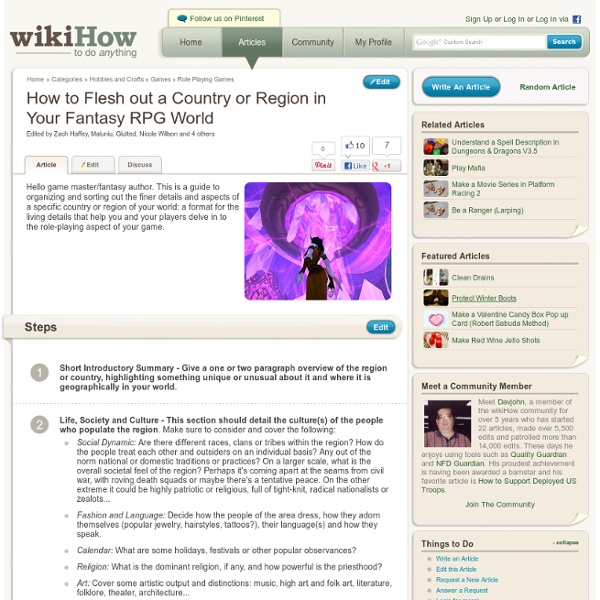The 100 Most Important Things To Know About Your Character (revised)
Quote from original Author(Beth):This list came about when, one day while struggling to develop a character for an upcoming Hunter game, my lovely roommate Nikki looked at me and said something like, "Wouldn't it be cool to have a list of questions you could go through and answer while you were making characters, so you'd make sure to consider all sorts of different elements in their personality?" I agreed, and that very evening we sat down over hot chocolate and ramen noodles to whip up a list of 100 appearance-, history-, and personality-related questions (which seemed like a nice even number) to answer as a relatively easy yet still in-depth character building exercise. Later on, we went through the list again, took out the questions that sucked (because there were a lot of them) and replaced them with better ones. What you see before you is the result of that second revision. Just don't email us specifically to tell us how much we suck. That only results in cranky gamerchicks.
The Domesday Book - Medieval Demographics Made Easy
The Domesday Book Penned by Brandon Blackmoor, based on Medieval Demographics Made Easy by S. John Ross Here is subscribed the inquisition of lands as the barons of the king have made inquiry into them... <p>Forsooth, thy browser is truly antiquated! Thou canst not access this web site with a browser such as thine.
Character Trait Chart
Character Trait Chart and Personality Components It can sometimes be helpful to make a Trait Chart for each character. This is especially helpful during the early stages of character development, before the character becomes as real to you as your mother. There are several charts of this sort available, some extremely detailed and some containing only facts and figures. I've tried to make one that includes the most important traits to help you visualize your character, both physically and emotionally.
How to Write a Synopsis of Your Novel
by Glen C. Strathy* To sell your novel, you may need to know how to write a synopsis, even if you are a pantser-type novelist who can write a whole novel without making an outline first. Agents and publishers will often ask for a synopsis along with sample chapters before they request a complete manuscript. The biggest mistake most people make when they try to write a synopsis for the first time is to create a bare bones plot summary, along the lines of “First this happens, then this happens, then this happens...”
Character meme fun!
This is how I was procrastinating during the exam period. "Post-processual theory? ...After I've cleared out my hard drive, I think... ... ooh! What's this?
How to Write a Story: Creative Story Ideas, Tips to Help You Write Your Own Book
Get creative story ideas, write your own book! Want to write a good book? Check out these tips on how to write a story that captures readers' attention from beginning to end: How to Write a Story #1: Know Your Market, Get Story Ideas and Outline Your Plot
Fiction Writing Mistakes
Take advantage of our Instructor of the Month deal and get all of James Scott Bell’s bestselling books on writing (and more) for one heavily discounted price. Order Now >> The best fiction writers write like they’re in love—and edit like they’re in charge. First drafting should be a wild and wonderful ride, full of discovery, dreams and promises.
Writing Tips - Publishers list of phrases for writers to avoid
We have all met people who have the extraordinary ability to talk in clichés: Y’know, not to beat around the bush or hedge your bet, this section is a must-read because it calls a spade a spade and in a nutshell leaves no stone unturned to pull the rug from under those off-the-cuff, old-hat bête noires called clichés. These are the people who’ve given the cliché its bad name. We all tend to use them, of course. Sometimes that familiar phrase is the neatest way of expressing yourself and most of us can, in a flash (cliché), unconsciously call up a few hundred of them to help us out in writing and conversation. But how aware are we of the irritation (or worse, sniggering) that the overuse of clichés can cause?
Said Is Not a Four-Letter Word
NOTESPart of the "Variety Is the Spice of Life, and I Need Some Tums" set of essays. For the others, see:Purple Fanfic's (total lack of) Majesty | Epithets: Fandom's Designated Hitters written December 2004 "Said" Is Not a Four-Letter Word by Arduinna Many people seem to be afraid to repeat the word "said" in dialogue tags -- the phrases that explain who's talking, and in what manner.
How to Hook Your Readers
on June 14th, 2010 by Fiction Editor Beth Hill and last modified on November 8, 2010 Remember the musical number from Gypsy, “Gotta Get a Gimmick”? The strippers advised Gypsy Rose Lee that to be successful, she’d need a gimmick, something eye-catching that would grab the attention of audience members. Writers likewise need attention-attracting elements to steer the focus of their readers to the story in their hands (and keep it there). Books compete with TV, computers, movies, hand-held devices and who-knows-what-else for attention. If your book’s opening doesn’t capture the reader, doesn’t draw her into your tale, you’re going to lose her.



